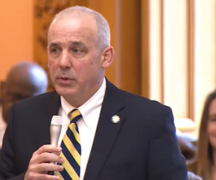Insurgent GOP faction focuses on effort to make state constitutional amendment passage more difficult
BY NICK EVANS
Ohio House Speaker Jason Stephens Wednesday morning charted a course for the coming House term. The Kitts Hill Republican has a lot on his list — even before considering the budget.
There’s just one problem. On Wednesday afternoon, leaders of different, and larger, faction of the GOP laid out a competing vision. That sect, which Stephens aligned with Democrats against in order to take control, insisted their priorities would set the agenda.
The top priority on that faction’s list is raising the threshold needed for voters to amend the Ohio Constitution. They say this is to protect the laws legislators have made. The sponsor of the proposal in a December letter to House colleagues specifically pointed to protecting the state’s abortion ban and the constitution from further anti-gerrymandering reform.
A speaker’s dozen
Since his surprise victory in the House leadership race, Speaker Stephens has studiously avoided publicity. He’s repeatedly canceled floor sessions and dragged his feet in setting up committees. Instead of inaction helping tempers cool, it has given fresh fodder to his critics.
Flanked by supporters Wednesday, Stephens introduced the twelve priority bills of his speakership. He described the overall vision as making Ohio more competitive, “which means growing our economy, protecting our families, and educating our communities.”
He explained there are four bills within each of those buckets. To grow the economy, they’re pursuing bills to “lower and flatten” taxes, invest in community development, create an affordable housing tax credit and rejigger state contracts — particularly regarding companies that engage in boycotts.
To protect families, Stephens described measures to increase adoption and improve maternal health access. That bucket also includes two big culture war issues like “protect(ing) the integrity of girls sports” so that “biological males cannot compete in a female only athletics,” and “preserv(ing) the fundamental role that parents play in the education of their children.”
The education bucket, meanwhile, includes proposals to improve teacher retention through student loan repayment, continue phasing in the school funding plan, and to refocus on what Stephens terms “career readiness.” The speaker also wants to advance a “child-first model for education.” He later explained that’s the so-called “backpack bill” which allows students to take their per-pupil funding with them to a private school of their choosing.
Kumbaya?
Stephens may have needed Democratic support to take the speaker’s gavel, but his priorities are far from liberal. Despite the apparent rift in the GOP, Stephens insisted relations are good and that his priorities include input from members of the competing faction.
“We had our retreat a week and a half ago. Everybody was cordial, we had good conversations, played some euchre and it was a good time, but we also discussed a lot of policy,” Stephens said.

The insurgents’ reaction
Rep. Derek Merrin, R-Monclova Township, was speaker-in-waiting after winning a GOP caucus vote late last year. Since Stephens’ ascent, Merrin and members of what would’ve been his leadership team, have sought to maintain their supporters’ cohesion.
Speaking outside the House chamber, Merrin criticized Stephens for cancelling floor sessions and otherwise stalling bills. “They’re not ready to govern,” he insisted. Merrin also maintained that he, and not the speaker, is leading the Republican caucus — connecting Stephens instead with Democrats.
“We’re all reviewing the priorities of Jason Stephens and the Democrats, of the bills that they released today,” Merrin said. “And we look forward to supporting many of the bills that advance conservative principles and a Republican agenda.”
Still, Merrin argued there are “gaps” in Stephens’ priorities — none bigger than the resolution raising the threshold for constitutional amendments.
“The number one issue right now is protecting our constitution from liberal interests that look to hijack our constitution,” Merrin asserted. “We can pass whatever bill we want in the House, in the Senate, but if we’re going to allow our constitution to be hijacked, it completely ruins all the work of the people’s representatives have done.”
Stephens has referred the measure to committee and expressed confidence the chair, a Merrin supporter, “will be able to handle the gravity of this issue.” The measure’s sponsor, meanwhile, remains skeptical. Rep. Brian Stewart, R-Ashville, argued he filed it with “ample time” to make the May ballot, and referring it to a committee now the deadline has passed isn’t much consolation
“The question is,” Stewart said, “is it going to be gutted in Rules and Reference? Is it going to be watered down? Is leadership going to take a hatchet to the guts of what our caucus is trying to see done?”
Competing priorities
While Speaker Stephens argues relations are good, he and Merrin’s camp are locked in a fight over the party’s campaign fund. Merrin’s supporters insist that as the majority of GOP members they control it, and they’re willing to go to court over it.
Rep. Phil Plummer, R-Dayton, said they’re trying to include Stephens’ team, offering them “a seat at the table,” but that Stephens has so far rebuffed their efforts.
“We keep offering olive branches,” he said. “We’re ready to go ready to work with them but they keep shutting us out and disrespected us.
“We’re not gonna back down. We have the votes,” Plummer added.
Stephens said he did not expect a legal challenge over the issue.
That ongoing scuffle will move from backroom fights over the caucus checkbook to the policy realm soon, though, Merrin promised. He explained they didn’t lay out their own batch of priorities to be “deferential” to the speaker.
But after enumerating a laundry list of issues, many of which are reflected in the Stephens’ priorities, Merrin insisted they’d share a “broad agenda” soon.
Also from Ohio Capital Journal:




